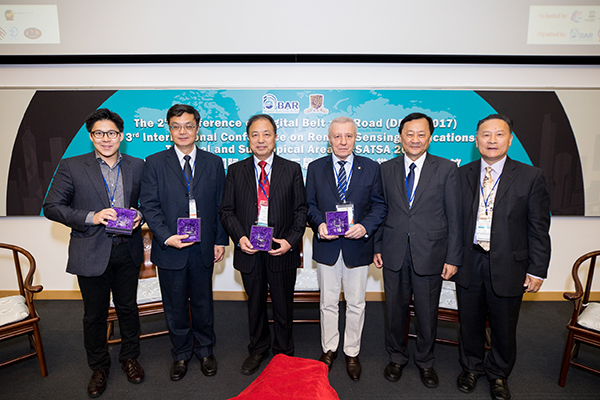

About 200 scholars from over 20 countries and international organizations gathered in Hong Kong on Dec 6 at a "Digital Belt and Road" conference to discuss promotion of sustainable development of countries along the Belt and Road with the help of Earth observation technologies and big data.
"The Belt and Road Initiative is a long-term, complicated, arduous system engineering feat covering a wide geographical range and long time periods, and crossing into many fields of study," Guo Huadong, a professor of the Chinese Academy of Sciences (CAS) Institute of Remote Sensing and Digital Earth (RADI), said at the Second Conference of the Digital Belt and Road.

The first eight International Centers of Excellence (ICoE) of the DBAR are established during the Second Conference of the Digital Belt and Road on Dec 6. (Image from CAS)
"Big Earth Data, derived from but not limited to Earth observation, having macro-level capabilities that enable rapid, accurate monitoring of Earth, can transform our approach to comprehensively understanding the challenges of sustainable development," added Guo, who is also chairman of the Digital Belt and Road (DBAR) International Science Program, launched in 2016 by CAS to promote international cooperation on Earth observation and Earth big data.
"Big Earth data represents a new horizon for human beings to understand our planet with a new method for studying Earth's environment," he said. "It will also provide scientific decision-making support for construction in the countries and regions along the Belt and Road."
The three-day conference released the DBAR Science Plan, which elaborates the DBAR program's objectives and implementation. The conference also agreed to establish eight International Centers of Excellence (ICoE) in eight countries on four continents to promote data and technological cooperation on issues including environmental protection, disaster risk control, food safety, and natural and cultural heritage preservation.
Valery Bondur, vice president of the Russian Academy of Sciences, said that Earth observation technologies have become an internationally-recognized means of modern social governance, and China, one of the world's most active space powers, has contributed remarkably to the field of international Earth observation.
The DBAR has built a cooperative platform for scientists from both China and Russia in the field of Earth observation, and has provided a new method of facilitating global sustainable development.
Monthip Sriratana, director of the Climate Change Strategy Center of the National Research Council of Thailand (NRCT), said that Earth observation technologies have great potential to address global challenges in terms of the environment, natural resources, energy, and disaster prevention and response. They may also facilitate sustainable development.
The NRCT and CAS "jointly took the lead in establishing an ICoE under the umbrella of the DBAR program in Thailand as a regional center of the Southeast Asian region," she said. "It is believed that the success of the DBAR ICoE in Thailand will make enormous contribution to capacity building in Earth observation in Thailand and the whole region."
Source: Xinhua